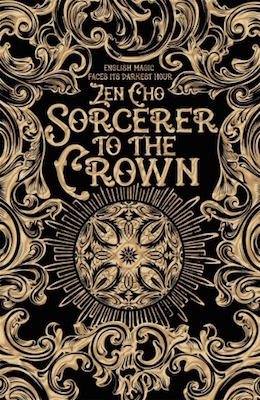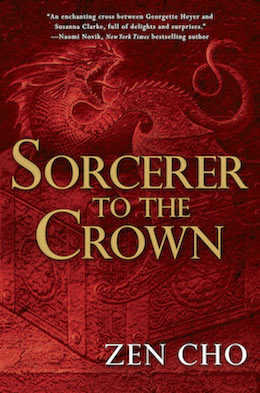Zacharias Wythe has just received a rather unexpected and unwanted promotion to Sorcerer Royal—the leader of the Royal Society of Unnatural Philosophers, magical protector of England, and the face of English magic. His job would be hard enough if his sole task was uncovering the source of the precipitous drain in his nation’s magic, but it’s made worse by the growing contingency of rich, old white guys who don’t think a former slave is “English enough” to boss them around. His dark skin color makes it easy for them to accuse him of murdering Sir Stephen, his guardian, mentor, and the man who bought his freedom, in order to usurp his power.
Prunella Gentleman, meanwhile, has had just about enough of toiling away at a school for magical girls that insists on teaching young women how to eradicate their powers rather than use them. The answers to the mystery of her parentage and the secret treasures of her inheritance await in London, but as respectable woman with unrespectable brown skin, her opportunities are limited. She attaches herself to Zacharias and the two set about trying undo centuries of systemic racism and sexism and preventing an all out war between Malaysian lamiae, racist British thaumaturges, powerful French sorcerers, and mercurial fairies. All in a day’s work.
I can’t tell you how excited I was about Sorcerer to the Crown when I first read the summary. A Regency-era fantasy novel? Yes! With a Black man and biracial Indian woman as co-leads? Hell yes! Written by a Malaysian woman? *Explodes into a million pieces*. There are many, many, many things I loved about this book, so many that I had to cut out about half this review just to get it to a reasonable length.
Let it be now and forever known that I am a massive Jane Austen fanatic, with a particular love of Pride and Prejudice. I own three copies each of the 1996 and 2005 movies, the latter of which I watched every Saturday morning for a year and a half. If my house burns down, the only things I’m taking with me are my rats, my cellphone, and my dog-eared, marginalia-riddled Penguin Classics edition. As such an Austen nut, Sorcerer to the Crown felt like Pride and Prejudice but with magic and race, which makes Zen Cho Austen crossed with Susanna Clarke and Ignatius Sancho. Zacharias is Darcy minus his haughty arrogance, all self-enforced duty and begrudging acquiescence, while Prunella is a vivacious combination of Lydia’s impulsiveness, Lizzie’s wit and candor, and Charlotte’s practicality and sense. I’ve been in a constant state of re-reading Pride and Prejudice for well over a decade, and yet I never fail to discover a new way to interpret a line. Cho has crafted a narrative that changes depending on what context you bring to the proceedings. You can read it as a comedy of manners, period low fantasy, critique of race relations, challenge to sexism and misogyny, or all of the above.
It isn’t a perfect book. Sometimes the language gets too purple, and a couple of times the action moved so quickly I had to go back to figure out what happened. However, the story and characters are so delightful that the clunkier aspects were negligible overall. Some reviewers complain about not finding Zacharias likable enough, and with a character as enticing and raucous as Prunella, he pales in comparison. It’s hard to get to know someone who survives only by not letting anyone know his true thoughts, but as a Black woman who has lived most of her life in a mostly white region I sympathized immensely with his situation.
 But the absolute best part was how Cho handles race in Regency England. No matter how much the bigoted Mr. Midsomer and his ilk disapprove, Zacharias is a gentleman and gentlemen must be afforded a certain level of civility. But as Zacharias and Prunella know, it’s easy enough to make your poisonous intentions known without being explicit. Today we call those microaggressions: “brief and commonplace daily verbal, behavioral, or environmental indignities, whether intentional or unintentional, that communicate hostile, derogatory, or negative racial slights and insults toward people of color.”
But the absolute best part was how Cho handles race in Regency England. No matter how much the bigoted Mr. Midsomer and his ilk disapprove, Zacharias is a gentleman and gentlemen must be afforded a certain level of civility. But as Zacharias and Prunella know, it’s easy enough to make your poisonous intentions known without being explicit. Today we call those microaggressions: “brief and commonplace daily verbal, behavioral, or environmental indignities, whether intentional or unintentional, that communicate hostile, derogatory, or negative racial slights and insults toward people of color.”
The accusations hurled against Zacharias don’t exist in a vacuum. The men who think him ill-suited to be Sorcerer Royal don’t just not like the idea of a person not born on British soil holding the staff, or even a freed slave. One of the excuses used to support slavery was that Africans were animal-like in intellect and work capacity, meaning it was just as fair to enslave an African as it was to own an ox or draft horse. Black men in particular were called vicious animals with inhuman strength and an uncontrollable temper. Zacharias’ very existence is an affront to their racist opinions because he completely refutes them. It’s not just that he has been raised above his station but they feel as if they’ve been brought down because they hold him in such low regard. Zacharias recognizes that such opinions reflect negatively on those that hold them, not him, but that doesn’t make the situation any easier to swallow.
Moreover, Cho ably demonstrates the intersectionality underlying the characters’ experiences of discrimination and oppression. Neither Prunella or Zacharias have it “worse” than the other; both must bear polite racism and pernicious microaggressions but with different intentions and contexts. Prunella suffers from the other side of the coin as Zacharias. She’s light-skinned enough to make her way through society, but “other” enough that without the presumption of her white father being a monied gentleman she’d never land a respectable husband. She must deal with the disgrace of being a person of color, suffer the condescension that comes with being a woman, and the indignity of being a woman of color. Without Sir Stephen or the staff, Zacharias has the freedom to go off a live a quiet life, but Prunella has no such options. Not only is she stirring the pot of race relations but she’s circumventing gender stereotypes and stomping all over the social caste system.
Prunella and Zacharias both deal with white allies, with varying degrees of success. Sir Stephen and Mrs. Daubeney certainly saved Zacharias and Prunella from terrible lives, but there was nothing pure-hearted about their actions. They care for their charges, but are never equals. Zacharias and Prunella will always be in debt to their saviors whether either party like it or not. They’re operating in the same context as freed slaves and early abolitionists who called for an end to slavery because it was cruel, not because they thought African Americans equal to whites. Although slavery was abolished in England and Scotland in 1772, it wasn’t until 1833 that it was eradicated throughout the empire (excluding Saint Helena, where Bonaparte would eventually be imprisoned, and the Indian colonies).
Prunella and Zacharias are free according to the law but just as enslaved by race relations, meaning they can’t do much of anything without the assistance of helpful white men. And unfortunately for them their allies prefer the status quo because challenging it puts their cushy privilege at risk. Or, as Zacharias put it in a conversation with Prunella, “My colleagues are compelled to deal with me, however much they may dislike it. But in the circles to which you aspire, I am of no account whatsoever. A magic-making African might serve as a diversion in high society, but never more than that. Society would never consent to be influenced by such as I.”
Cho doesn’t just shake up racial diversity, but gender diversity as well. Much of the plot revolves around powerful women using magic to fight back against an unjust (and male-dominated) system. While Zacharias’ story provides the skeleton, the heart, soul, and blood come from these women. It is Prunella who advances the story, another woman who provides her and Zacharias with the clues they need for the final confrontation, a third woman to provide Prunella with her power, and a fourth to stand as the Big Bad. Men—Zacharias included—are frequently left standing aside trying to figure out what to do as the women do battle. Characters, regardless of gender or ethnic background, are given a variety of personalities, all of whom are varied and unique. At every opportunity, Cho summons then smashes stereotypes. This isn’t tokenism: it’s diversity at its best.
TL; DR: I am in utterly love with Sorcerer to the Crown. Might as well take my money now because I cannot wait to see where the trilogy is headed. From one woman of color and fantasy fan to another, thank you, Zen Cho.
Sorcerer to the Crown is available now in the US from Ace Books and publishes September 10th in the UK from Tor Books.
Read am excerpt from the novel here on Tor.com!
Alex Brown is an archivist, research librarian, writer, geeknerdloserweirdo, and all-around pop culture obsessive who watches entirely too much TV. Keep up with her every move on Twitter and Instagram, or get lost in the rabbit warren of ships and fandoms on her Tumblr.










